You might be tossing paper towels in the trash without a second thought, but did you ever pause to consider their potential utility in you composting bin?
The question of whether you can compost paper towels is more nuanced than you might guess. Many of us rely on these disposable wonders for cleaning up spills, drying hands, and a host of other tasks. This article peels back the layers on paper towel compostability, shedding light on when they can be green warriors in your compost bin and when they’re better off in the trash.
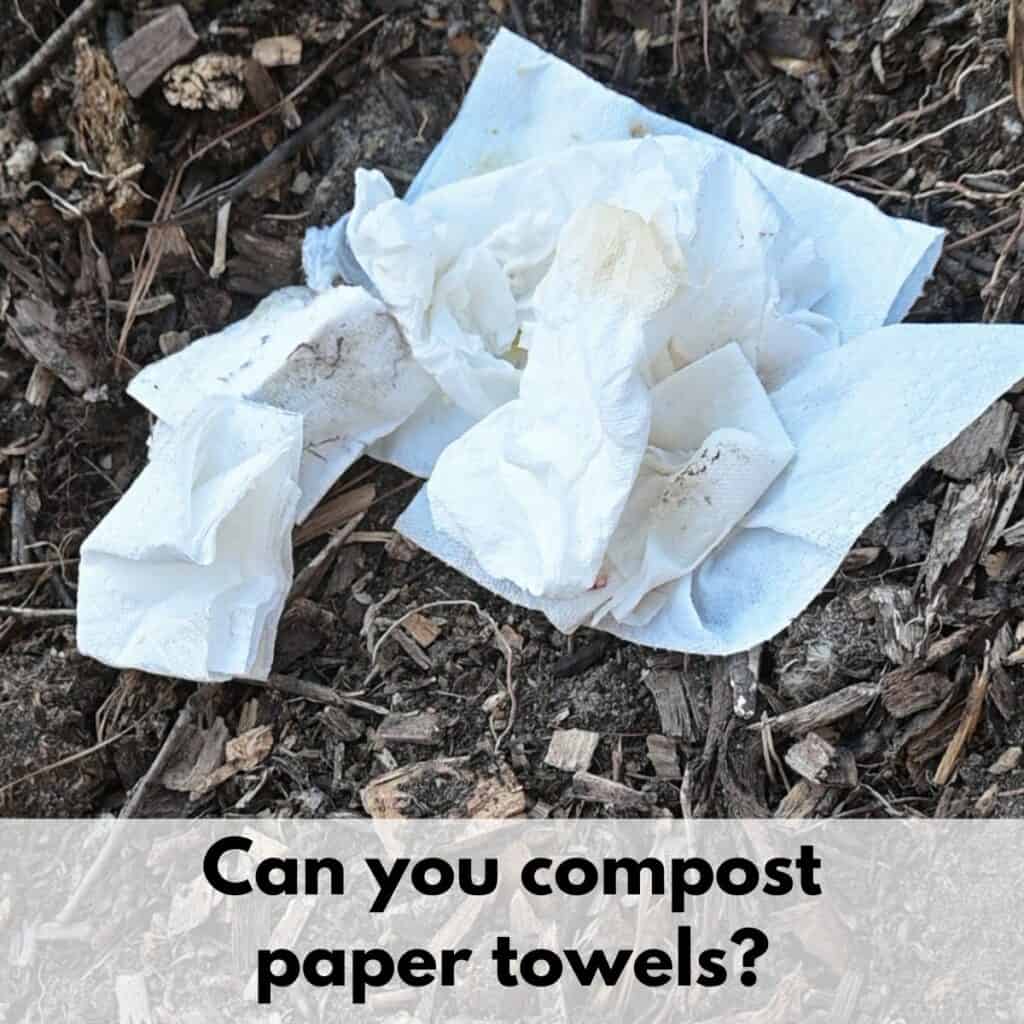
This post includes affiliate links, which means I may earn a commission on purchases made at no additional cost to you.
Key Takeaways:
- Not all paper towels are created equal when it comes to composting, especially those used with oils or chemicals.
- Simple steps can integrate even small pieces of paper towel waste into your home compost.
- Adopting eco-friendly alternatives to paper towels can further reduce your environmental footprint.
Table of Contents
The Making of Paper Towels
Paper towels start their journey in factories where long fibers of virgin wood pulp or recycled materials are blended into a watery solution. The manufacturing process then takes this mixture and spreads out on a wide screen.
As it rolls through heated cylinders, the water evaporates, leaving behind the soft, absorbent layers we use every day.
Depending on their destined usage, some paper towels undergo bleaching to achieve a bright white color, while others retain their natural hue from the original materials. This process allows for the creation of both strong and soft paper products, ready to tackle spills and clean-ups around your home.
Can You Compost Paper Towels?
You might be surprised to learn that yes, you can compost paper towels. However, not all used paper towels make good compost material.
Ideal candidates for your compost heap are those that haven’t encountered oils, chemicals, or any substances harmful to your garden’s ecosystem. These additives can hinder decomposition or introduce unwanted elements into your compost.
Clean, unused paper towels can be added directly, while those lightly soiled with water or organic materials, like drops of juice or bits of food, can also join the mix. But, draw the line at dirty paper towels contaminated with grease, harsh cleaning products, or used for heavy-duty messes.
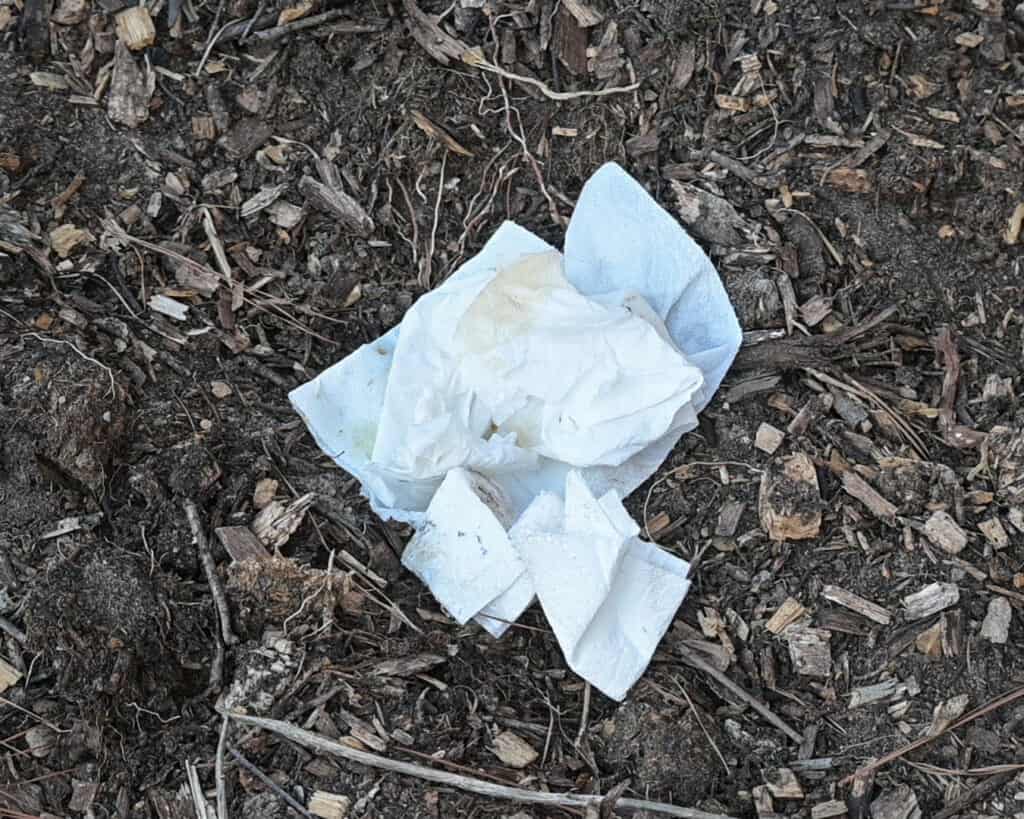
If you use natural, biodegradable cleaners, they’re okay to add to your compost pile in small amounts on paper towels. A vinegar based cleaner, for example, will not hurt yoru compost pile (and might even help it out if you’re using a fermented apple cider vinegar).
Many people will tell you not to compost towels with cooking oils or dairy. I’m not that person. While I wouldn’t pour cooking fat on my compost, I most definitely add spoiled dairy directly to it.
Some have expressed concern about viruses lingering in paper towels and infecting their compost pile. While it’s true that you don’t want to put infected plants in your compost, there’s less reason to be concerned about common viruses that might end up on a paper towel.
Cold and flu viruses cannot survive without a host for the months your compost will take to break down. If your kiddo blows their nose on a pepr towel and it ends up in the compost pile, don’t panic.
Some bacteria can be very persistent at room temperatures (source). If you introduce paper towels that could be contaminated with e-coli or salmonella, it’s important to make sure your compost is nice and hot and/or hold it for up to two years before using it.
In short, while most paper towels have the potential to return to earth as beneficial compost, their last job in your home dictates their compostability.
For your compost pile’s health, you may want to source compostable paper towels. You may not want to add heavily bleached paper towels to your compost pile. Instead, look for unbleached paper towels. They have a lesser environmental impact than bleached towels and are healthier for your home compost bin.
Don’t stress adding a few bleached paper towels, though. It’s unlikely to have a detrimental effect on a vigorous compost pile.
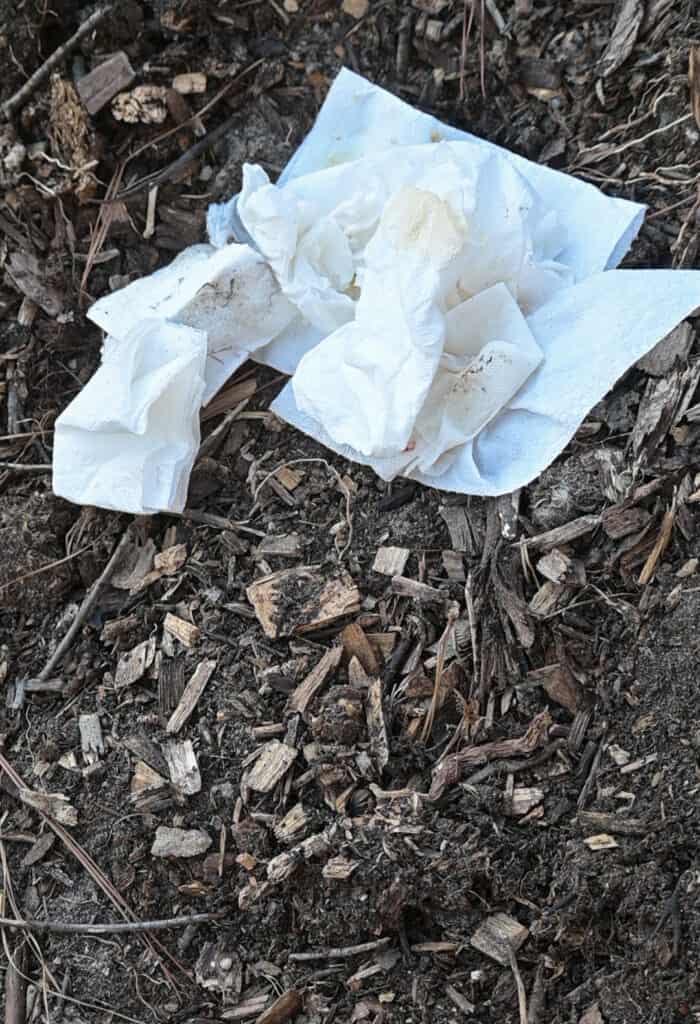
How to Compost Paper Towels at Home
Adding paper towels to your compost bin is easy, but keep a few pointers in mind.
First, shred (or rip) them into small pieces. This increases their surface area, making it easier for microbes to break them down.
Use paper towels that haven’t been contaminated with oil, chemicals, or cleaning products. These substances can harm your compost’s balance and may even pose health risks.
(Let’s be honest for a second here – you and I both know you’re not going to shred your paper towels before you put them in your home compost pile. Even I am not actually that dedicated, and I’m pretty serious about compost! It is a good idea to tear up your paper towels and it helps them break down faster, but you’ll be okay if you don’t.)
Next, mix these shredded, clean paper towels with other organic materials in your compost. They’re considered brown material, helping balance the green material, like food scraps, to create a healthy compost pile. In the photo below, you can see paper towels next to some moldy blackberries in my compost bin:
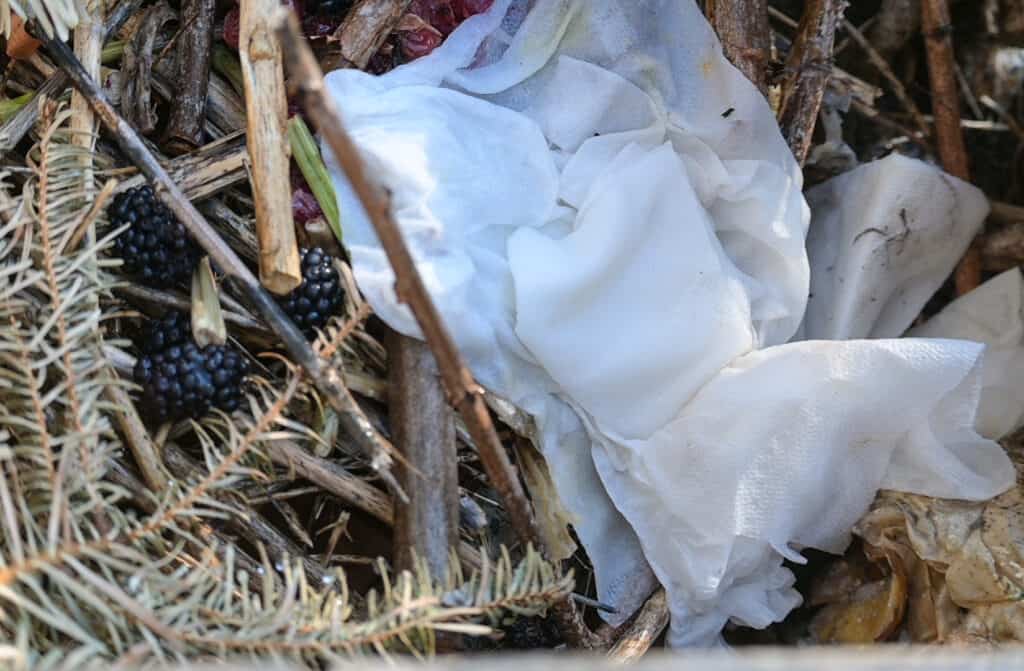
Watering your compost regularly helps it decompose. If you go ahead and water your paper towels, it also helps them not blow away.
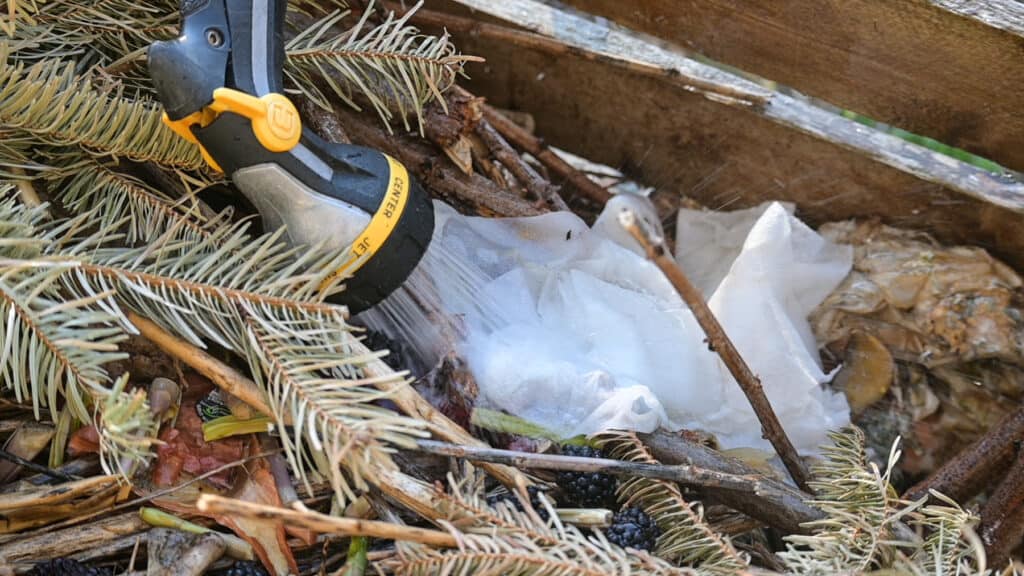
Paper towels don’t have any outstanding micronutrients to add to your composting process, but they do contain carbon and some nitrogen. Also, recycling single-use items is a good practice and they help balance hot, nitrogenous materials. For example, layering paper towels with fresh grass clippings can help keep the grass clippings from turning into a slimy, stinking mess.
Eco-Friendly Great Alternatives to Paper Towels
Switching to reusable paper towel alternatives not only reduces waste but also promotes a sustainable lifestyle.
Cloth towels stand out as a versatile option. You can repurpose old t-shirts or towels, cutting them into smaller pieces for quick clean-ups or drying hands. These cloth pieces are machine washable, making them a long-term investment for your kitchen and household chores.
Another fantastic alternative is Swedish dishcloths. Made from cellulose and cotton, these dishcloths are super absorbent, durable, and can replace up to 15 rolls of paper towels.
After use, simply toss them in the dishwasher or washing machine, and they’re good as new. Not only do they tackle spills and drying tasks with ease, but they also contribute significantly to reducing the demand for single-use paper towels.
Finally, bamboo paper towels offer another eco-friendly choice. They’re strong, absorbent, and made from a sustainable source. Better yet, they’re reusable (for a while). After a rinse and air dry, they’re ready to tackle another mess, making them an excellent habit for a greener home.
If you want to stick with a more familiar paper towel product, opting for a brand like Seventh Generation is friendly for the environtment and your compost poile.
Adopting these alternatives not only lessens your environmental footprint but also encourages a shift towards more conscious consumption and waste reduction.
Toward a Greener Tomorrow: The Role of Paper Towels in Sustainability
You find yourself at the crossroads of convenience and sustainability every time you dry your hands, mop up a spill, or wipe down surfaces with a paper towel. The ease of grabbing a disposable towel is undeniable, yet each use carries a weight far heavier than the paper itself. Tackling the issue of paper towel waste might seem like a drop in the ocean of environmental challenges, but it’s a meaningful step toward greener living.
Composting paper towels is a smart move. By adding used towels to your compost heap, you’re not only reducing waste but also contributing organic matter to create nutrient-rich soil.
Remember, the compostability of paper towels hinges on their cleanliness and whether they’ve been used with harsh chemicals. Clean, unused paper towels break down smoothly in a compost bin, turning into beneficial material for your garden or potted plants. This practice transforms a simple act of disposal into a cycle of reuse that enriches the earth.
The ultimate goal should be to reduce the use of disposable paper products altogether. Opting for reusable alternatives like cloth rags, microfiber towels, or Swedish dishcloths can drastically cut down your paper waste.
These items are not only eco-friendly but also cost-effective in the long run, as they can be washed and reused multiple times. By making this switch, you’re not just saving trees; you’re also conserving the water and energy needed to produce disposable paper towels.
The path to sustainability is paved with choices that, while they might appear minor in isolation, collectively lead to significant environmental benefits.
Reducing paper towel use, composting what you do use, and embracing reusable options is a straightforward action plan for anyone aiming to make their household a little greener. Remember, every small step towards sustainability is a leap in conserving our planet’s health and resources.
Compost Tips
Do you know how to tell when your compost is ready to use? And how long does compost take, anyway?
You know your compost needs to be turned, but you're tired of breaking your back. Discover the best compost aerators to make aerating your compost easy.
Discover how to attract more earthworms to your garden for healthy soil and bountiful yields.
Natasha Garcia-Lopez is an avoid home-gardener and proud owner of 88 acres of land in rural West Virginia. She was a member of the Association for Living History Farms and Agricultural Museums for many years and is currently enrolled in the Oregon State University Master Gardner Short Course program so she can better assist you with your gardening questions.She holds a certificate in natural skincare from the School of Natural Skincare.

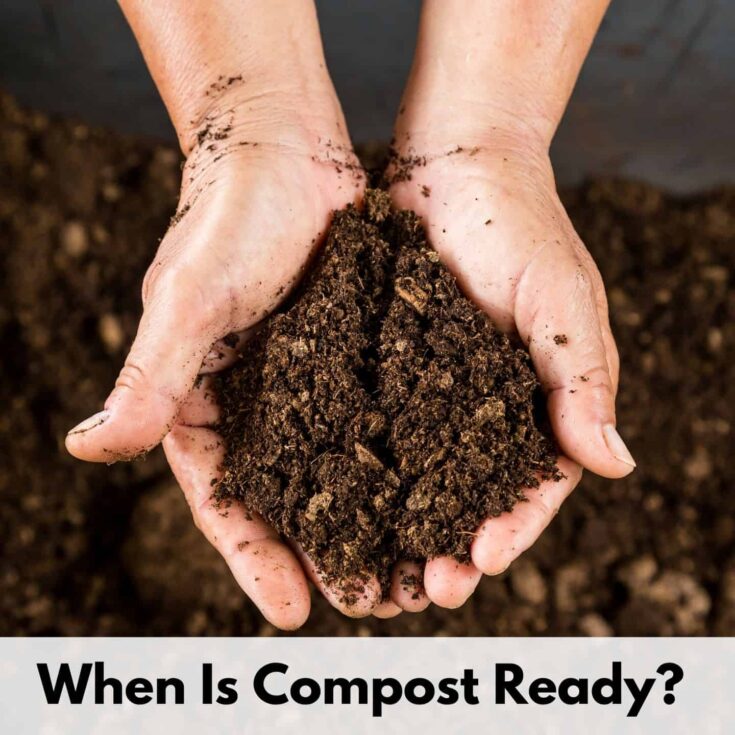
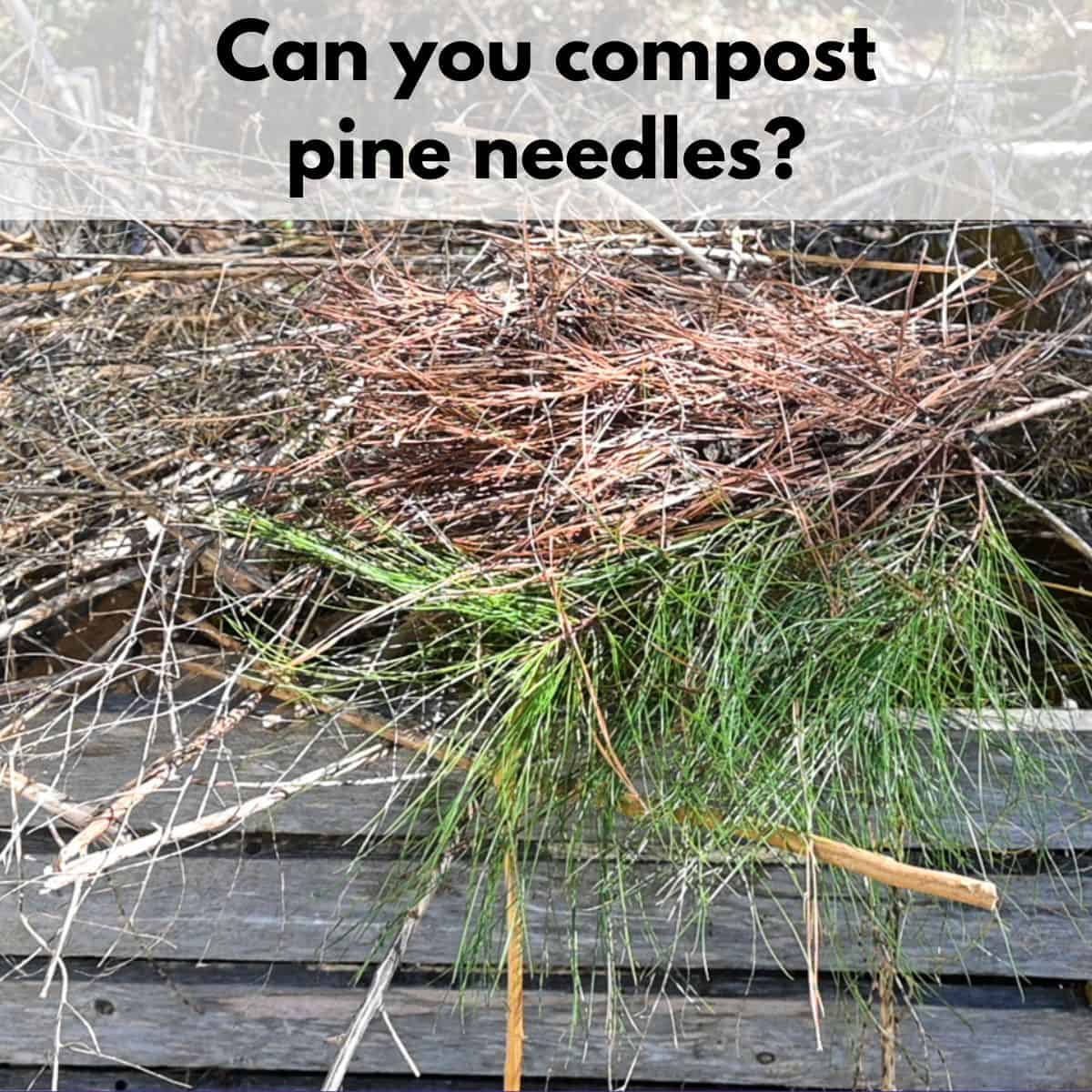
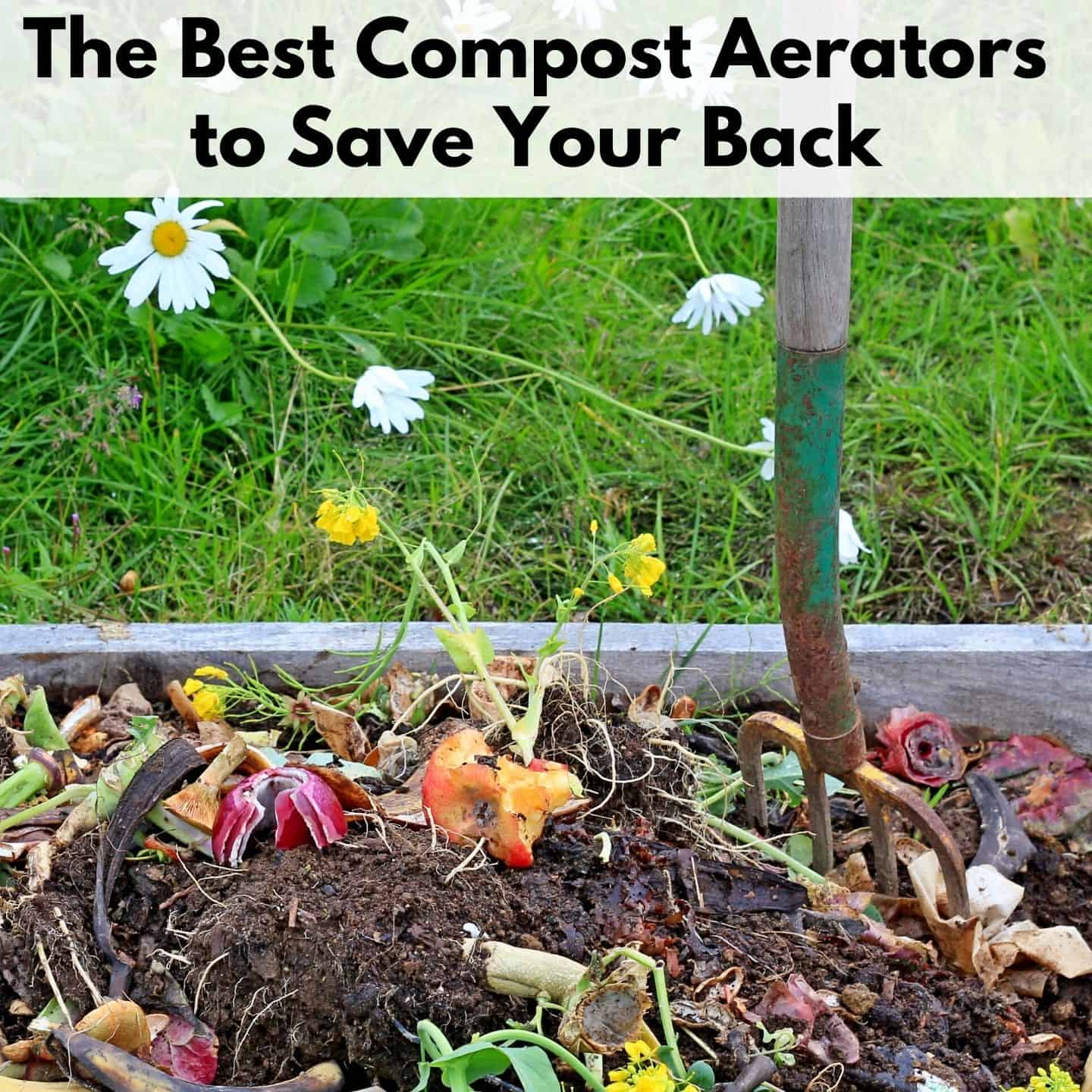


Leave a Reply